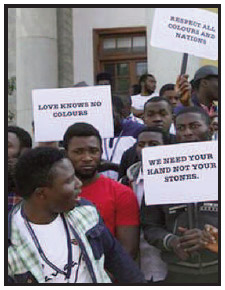
 |
MATTERS OF PUBLIC POLICY
Global Village, not just rhetoric !Let us adhere to our cultural values
Our Foreign Office issued a statement giving an 'assurance' that the guilty would be punished. Also held out, like on all such occasions in the past, a promise of steps to ensure the safety of the African youth and students. The clamour for the Tarun scalp brings up a trait we Indians possess not in a small measure but substantially as a part of our DNA. It is hypocricy. Both the Tarun Vijay-speak and the recent attacks on the Africans are a perfect opportunity to exorcize the ghosts of the past, snap the umbilical ties with intolerance syndrome, and reinvent our composite cultural value system, Gandhi and Nehru have come to be identified with. Who should take the initiative- the egg heads, the media, the Twittereti, the Aam Admi or the government endowed with a '56-inch' chest? Every one of them because every one of them has a stake in the Indian Kutumbakam. As the collective will of the people truly and honestly! The age-old concept, Vasudhaiva Kutumbakam, is more relevant today than ever before since the world has become a global village. Internet has made everything instant- news et al. If there are Africans in India, there are Indians in Africa. Brits and Americans are working in India even as their home lands are still the much fancied 'Vilyat' the average Indians wax eloquent about. Many in this country began to call the US 'racist' when attacks took place on Indian nationals or people of Indian origin with disconcerting regularity. Delhi mounted diplomatic pressure on Washington to extract an expression of concern. But, this Indian outrage looked hypocritical when a number of African youth in the Greater Delhi region were beaten by a mob—in a Noida Mall and on the street. The ostensible reason for 'instant justice' was the death of a teenager from over dose of drugs allegedly supplied by some unknown Africans. External Affairs Minister Sushma Swaraj, known also as the Minister of Twitter, sought a report from the chief minister of Uttar Pradesh. Our Foreign Office issued a statement giving an 'assurance' that the guilty would be punished. Also held out, like on all such occasions in the past, a promise of steps to ensure the safety of the African youth and students. Well, these are no more than proforma exercises. No effort was made to reach out to the victims or the African community. There is no hiding the fact that it is quite common, at least in the Hindi heartland, to find Africans being addressed as 'Habshi' and as objects fit for ridicule. This is not 'Afro-phobia' at work. It is because of no regular interaction at the community level. Also, sadly, because of no attempt to rid Indians of these very noxious beliefs. This is a task cut for the African diplomats and the Indian government as their tribute to Mahatma Gandhi and Nelson Mandela. Not surprisingly, envoys from African nations in Delhi, have condemned the handling of recent attacks on their students. They termed the Indian government's response as inadequate and called for "strong condemnation from the highest political level (both nationally and locally) of the government of India, as well as expediting legal actions against the perpetrators". Asking the highest political executive, a euphemism for Prime Minister (or chief minister), to speak up on issues in headlines is the game perfected for the political theatre. Not for diplomats,even if they tend to practise activism with calls for an investigation by the UN Human Rights Council into attacks on Africans in India. Such calls ignore the reality of India, a pulsating democracy with its very own checks and balances that has always stood by Africa. Diplomats are not agenda oriented activists, for whom the media coverage is the oxygen and fleeting presence on the idiot box is the nirvana ! |
|


